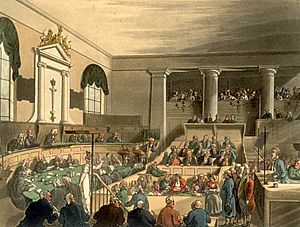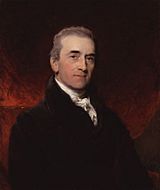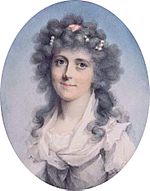William Garrow facts for kids
Quick facts for kids
Sir William Garrow
|
|
|---|---|
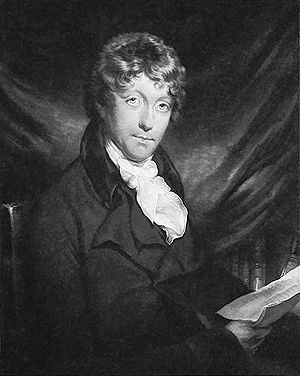
William Garrow in 1810, aged 50
|
|
| Solicitor General for England and Wales | |
| In office June 1812 – May 1813 |
|
| Preceded by | Sir Thomas Plumer |
| Succeeded by | Sir Robert Dallas |
| Attorney General for England and Wales | |
| In office May 1813 – 6 May 1817 |
|
| Preceded by | Sir Thomas Plumer |
| Succeeded by | Sir Samuel Shepherd |
| Baron of the Exchequer | |
| In office 6 May 1817 – 22 February 1832 |
|
| Preceded by | Richard Richards |
| Succeeded by | John Gurney |
| Personal details | |
| Born | 13 April 1760 Hadley, Middlesex, England |
| Died | 24 September 1840 (aged 80) Ramsgate, Kent, England |
| Political party | Whig |
| Spouse | Sarah Dore |
| Profession | Barrister, politician, Judge |
Sir William Garrow (1760–1840) was an important English barrister, politician, and judge. He is famous for changing how court cases work. He helped create the "adversarial system," which is used in many countries today. In this system, lawyers for each side argue their case to a judge or jury.
Garrow also introduced the idea that a person is "presumed innocent until proven guilty." He believed that people accusing someone of a crime, and their evidence, should be carefully checked in court. He was born in Monken Hadley, England, and studied law from a young age. He became a lawyer in 1783 and quickly became known for defending people in criminal cases.
Later, Garrow became a King's Counsel, meaning he helped the government with important cases. He also became a politician, serving in Parliament. He was even the Solicitor General for England and Wales and then the Attorney General for England and Wales. In 1817, he became a judge, serving for 15 years. His work was largely forgotten for a long time, but interest in him grew in the 1990s. His ideas still influence law today, and a TV show called Garrow's Law was made about his early career.
Contents
Early Life and Education
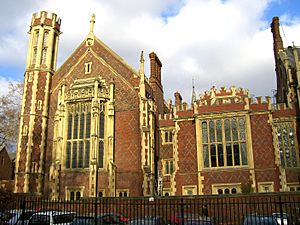
William Garrow's family came from Scotland. His father, David Garrow, was a priest and ran a school in Monken Hadley, near what is now Greater London. William was the third son named William, as the first two died as babies.
William went to his father's school, The Priory, until he was 15. The school taught subjects like English, Greek, Latin, French, geography, and math. It also focused on social skills to prepare students for careers in business. William was good at English and French.
After school, he worked for a lawyer named Thomas Southouse in London. William was very hardworking and careful. Southouse suggested he become a lawyer. So, at 17, William became a student of Mr. Crompton, a special legal expert. William studied hard, reading old law books. He also spent a lot of time watching cases at the Old Bailey, a famous criminal court.
In the 1700s, many people improved their speaking skills by joining debating clubs. William was shy at first, but he soon became a well-known speaker. People called him "Counsellor Garrow, the famous orator." In 1778, he joined Lincoln's Inn, one of the main legal societies. He officially became a lawyer on November 27, 1783, when he was 23 years old.
Career as a Barrister
Defending Clients
Garrow began his career as a criminal defence lawyer at the Old Bailey. At that time, many people accused of serious crimes relied on lawyers to help them. His very first case was actually as a prosecutor, but he quickly became known for defending people.
Garrow was famous for his strong and direct way of questioning witnesses. In one case in 1784, a witness accused a man named James Wingrove of robbery. Garrow questioned the witness so well that the witness admitted he was lying to get a reward. Garrow disliked "thief-takers," who were people who tried to catch criminals to get rewards, sometimes by lying.
He also used a clever tactic called "jury nullification." In the 1700s, many crimes could lead to the death penalty. In 1784, two women were accused of stealing fans worth 15 shillings, which meant they could be executed. Garrow convinced the jury to say the fans were only worth 4 shillings. This changed their sentence to 12 months of hard work instead of death.
Prosecuting Cases
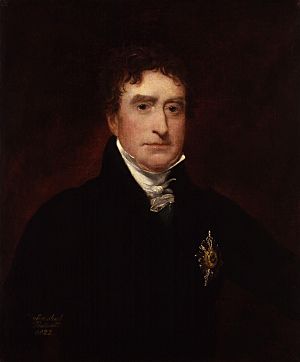
Garrow's reputation grew, and he handled many criminal cases both in London and outside. By 1799, he was one of the busiest lawyers. In 1793, he was made a King's Counsel. This meant he would help the government prosecute important cases, especially those involving treason (betraying the country).
During the time of the French Revolution, the British government worried about similar uprisings in the UK. Garrow prosecuted many of these "state trials." He often faced other top lawyers like Thomas Erskine. In 1794, the government suspended certain rights and planned many arrests for treason. Garrow prosecuted cases against people like Thomas Hardy and John Horne Tooke, who were accused of trying to start a revolution. However, the juries found both men not guilty, and the other trials were stopped.
Garrow was against slavery. When sugar plantation owners, who used slave labor, offered him a job, he refused. He said he would never support practices he hated. In 1806, he was involved in a famous case against Thomas Picton, the Governor of Trinidad, who was accused of torturing a young girl. Garrow's opening speech in this case was considered one of his best.
Thanks to his connections, Garrow became the lawyer for the Prince of Wales in 1806. In 1812, he prosecuted Leigh Hunt for writing something against the Prince Regent. Hunt was found guilty, which was a change from an earlier trial where he was found innocent.
Political Career
Garrow entered Parliament in 1805, representing a small area called Gatton. He didn't enjoy being a politician and was rarely there unless he had to be.
In 1812, he became the Solicitor General for England and Wales, and then the Attorney General for England and Wales in 1813. As Attorney General, he was the government's top prosecutor. During this time, the Prince Regent was worried about people wanting to change the laws and government. Garrow was seen as someone who would oppose these changes.
He often disagreed with Sir Samuel Romilly, who wanted to reform the criminal law. For example, Romilly wanted to remove "corruption of the blood" from treason cases, which meant a traitor's family would also be punished. Garrow argued against this, and Romilly's bill failed.
Garrow also cared about animal welfare. In 1816, he supported a bill to increase punishments for people who rode horses until they were badly injured or died. Although his bill didn't pass, similar ideas later became law. In 1817, Garrow left Parliament and his role as Attorney General to become a judge.
Judicial Career
Garrow's first judge role was in 1814 as Chief Justice of Chester. Some people, like Sir Samuel Romilly, thought it was wrong for him to be both a judge and the Attorney General at the same time.
On May 6, 1817, Garrow became a Baron of the Exchequer, a type of judge. He wasn't particularly strong in commercial law cases, which the Exchequer specialized in. However, when he worked on criminal cases during "Assize Circuits" (when judges traveled to hear cases), he was excellent. He used his deep knowledge of criminal law from his years as a lawyer. Lawyers and defendants were often amazed by how much he knew about crime.
Garrow retired on February 22, 1832. As a sign of respect from the government, he was made a Privy Councillor. He passed away at his home on September 14, 1840, at the age of 80.
Personal Life
William Garrow had a relationship with Sarah Dore. They had two children, David William Garrow (born 1781) and Eliza Sophia Garrow (born 1784), before they married on March 17, 1793. Sarah was known for her elegance and was active in their local community in Ramsgate. She died in 1808 after a long illness.
Their son, David William Garrow, became a clergyman and a chaplain to the Prince of Wales. His grandson, Edward Garrow, was a cricketer. Their daughter, Eliza Sophia Garrow, married Samuel Fothergill Lettsom. One of her children, also named William Garrow, became the Consul-General for Uruguay.
Legacy and Impact
After his death, Garrow's work was mostly forgotten by legal experts for many years. However, interest in him began to grow in 1991 with an article by John Beattie. Later, other researchers also studied his contributions.
Garrow's ideas have been mentioned in court cases even recently. For example, in 1982, the Supreme Court of Canada quoted his instructions to a jury on how to understand witness statements. In 2006, the Irish Court of Criminal Appeal also used his work.
In 2009, BBC One aired a TV show called Garrow's Law. It was a fictional drama about his early days as a lawyer at the Old Bailey. The show was popular and had two more seasons.
Adversarial System
Garrow had a huge impact on the modern "adversarial court system" used in many countries today, even if he didn't fully realize it at the time. Before Garrow, people accused of serious crimes like robbery or murder were often not allowed to have a lawyer.
Garrow's strong and direct way of defending his clients helped change this. He pushed for a more active defence, which helped create the "new school" of lawyering. His aggressive style set an example for other lawyers, helping to balance a legal system that was often unfair to the accused. He was a leader in this change.
Garrow was ahead of his time in many ways. In 1791, he used the phrase "innocent until proven guilty." Although the jury didn't accept this idea then, it later became a core principle of law.
Rules of Evidence
Garrow also influenced the "rules of evidence," which were just starting to develop during his career. He insisted that "hearsay" (information heard from others, not directly witnessed) and copied documents should not be allowed as evidence. This led to the "best evidence rule," which means the original or most reliable evidence should be used.
He also strongly believed that lawyers should have the freedom to present their evidence. He even argued with judges to make sure lawyers had this independence. Garrow was also very good at questioning medical experts in court. He would use his sharp questioning and medical knowledge to challenge their opinions. For example, in one case, he questioned a medical expert so well that the expert admitted he couldn't prove how someone had died. Garrow taught other lawyers how to effectively question witnesses, which helped them win cases.
Images for kids
 | Charles R. Drew |
 | Benjamin Banneker |
 | Jane C. Wright |
 | Roger Arliner Young |


